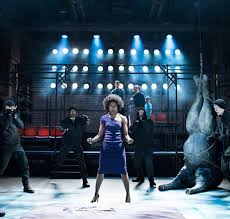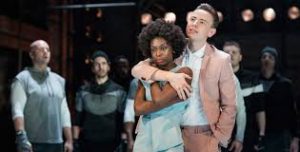
Joan Iyiola as the Duchess of Malfi
The non-Shakespearean plays are always the highlights. I don’t know if it’s that the RSC feels constrained by its status as the official company performing the national playwright, but the Shakespeare can feel cramped, at times awkward, and always over-familiar. But even a fairly often-played also-ran like John Webster’s bloody Jacobean tragedy The Duchess of Malfi has a freshness to it — not to mention the bizarre charm of some over-the-top stage business in the second act that involved pouring out a great pool of wild boar-or-bull’s blood onto the stage, in which expanding puddle every cast member splashed, slipped, and nearly drowned. Metaphors, anyone?
Joan Iyiola’s performance as the Duchess earned her ovation at night’s end with a thrilling, physical, charismatic performance that included glorious singing after (she thinks) her husband and son have been murdered by her evil brother. I could not tell what she was singing — Catholic chants would have been period appropriate, or African laments would express the implicit multiculturalism in the RSC casting. Iyiola anchored the production, and after her death in act 4 the men in her orbit — her non-aristocratic husband, the two brothers from whom she concealed the marriage, and the clever but duplicitous servant Bosola — tore themselves to pieces without her.
In one of the particular pleasures of Stratford, I bumped into Iyiola after the show at the Dirty Duck pub and was able to tell her how much I enjoyed her work. She seemed smaller out of costume.

The Twins (Joan Iyiola as the Duchess and Alexander Cobb as Ferdinand)
The other blazing performance in the show was Alexander Cobb in his RSC debut as Ferdinand, the Duchess’s twin and nemesis. In some ways I thought his performance the most powerful of the night, and his ability to match the Duchess was the core of the show’s success. His rage at his sister’s remarriage seemed inexplicable until, staring at her blood-soaked corpse on the low bed that was the main feature of the stage, he admitted to being her twin and bound to her for life. The play didn’t over-emphasize the Freudian incest theme — Webster’s play makes such psychological explanations seem both too pat and radically insufficient for the horrors on stage — but in that moment, especially, Cobb found a painfully human feeling inside the ultra-villainous brother. I look forward to seeing him in other roles!
The cast was universally strong, especially Chris New as the Duchess’s other brother, a sexually predatory Cardinal, and Nicholas Tennant as Bosola, who ultimately kills the Duchess’s husband in error and then dies last at the show’s messy conclusion. The male chorus, who alternately perform as a gathering of madmen outside the Duchess’s window and an assault team, were also engaging dancers.
It’s hard to know what to make of Webster’s painful anatomy of human self-destruction. The attack on toxic masculinity seems almost too obvious, not to mention undercut by the obvious pleasure the play (and audience) take in the super-violence. There’s a dark misanthropic core to this play, and in some other Jacobean tragedies, perhaps including Shakespeare’s. But the pleasure of this lucid production includes both the Duchess’s doomed bid for female independence amid patriarchal horror and the converse terrors of being caught inside that doomed world when you think, wrongly, that you may be in control of it.
Off to London today!